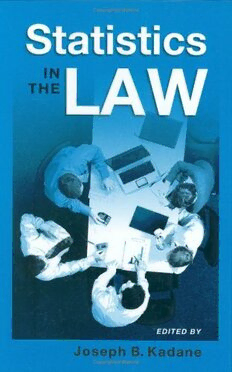Download Statistics in the Law: A Practitioner's Guide, Cases, and Materials PDF Free - Full Version
Download Statistics in the Law: A Practitioner's Guide, Cases, and Materials by Joseph B. Kadane in PDF format completely FREE. No registration required, no payment needed. Get instant access to this valuable resource on PDFdrive.to!
About Statistics in the Law: A Practitioner's Guide, Cases, and Materials
Statistics in the Law is primarily a user's manual or desk reference for the expert witness-lawyer team and, secondarily, a textbook or supplemental textbook for upper level undergraduate statistics students. It starts with two articles by masters of the trade, Paul Meier and Franklin Fisher. It then explains the distinction between the Frye and Daughbert standards for expert testimony, and how these standards play out in court. The bulk of the book addresses individual cases covering a wide variety of questions, including: ·Does electronic draw poker require skill to play? ·Did the New Jersey State Police disproportionately stop black motorists? ·Is a jury a representative cross section of the community? ·Were ballots tampered with in an election? The book concludes with Part 5, a review of English law, that includes a case in which a woman was accused of murdering her infant sons because both died of ''cot death'' or ''sudden death syndrome,'' (she was convicted, but later exonerated), and an examination of how Bayesian analyses can (or more precisely), cannot be presented in UK courts. In each study, the statistical analysis is shaped to address the relevant legal questions, and draws on whatever methods in statistics might shed light on those questions.
Detailed Information
| Author: | Joseph B. Kadane |
|---|---|
| Publication Year: | 2008 |
| ISBN: | 9781435653566 |
| Pages: | 470 |
| Language: | English |
| File Size: | 3.202 |
| Format: | |
| Price: | FREE |
Safe & Secure Download - No registration required
Why Choose PDFdrive for Your Free Statistics in the Law: A Practitioner's Guide, Cases, and Materials Download?
- 100% Free: No hidden fees or subscriptions required for one book every day.
- No Registration: Immediate access is available without creating accounts for one book every day.
- Safe and Secure: Clean downloads without malware or viruses
- Multiple Formats: PDF, MOBI, Mpub,... optimized for all devices
- Educational Resource: Supporting knowledge sharing and learning
Frequently Asked Questions
Is it really free to download Statistics in the Law: A Practitioner's Guide, Cases, and Materials PDF?
Yes, on https://PDFdrive.to you can download Statistics in the Law: A Practitioner's Guide, Cases, and Materials by Joseph B. Kadane completely free. We don't require any payment, subscription, or registration to access this PDF file. For 3 books every day.
How can I read Statistics in the Law: A Practitioner's Guide, Cases, and Materials on my mobile device?
After downloading Statistics in the Law: A Practitioner's Guide, Cases, and Materials PDF, you can open it with any PDF reader app on your phone or tablet. We recommend using Adobe Acrobat Reader, Apple Books, or Google Play Books for the best reading experience.
Is this the full version of Statistics in the Law: A Practitioner's Guide, Cases, and Materials?
Yes, this is the complete PDF version of Statistics in the Law: A Practitioner's Guide, Cases, and Materials by Joseph B. Kadane. You will be able to read the entire content as in the printed version without missing any pages.
Is it legal to download Statistics in the Law: A Practitioner's Guide, Cases, and Materials PDF for free?
https://PDFdrive.to provides links to free educational resources available online. We do not store any files on our servers. Please be aware of copyright laws in your country before downloading.
The materials shared are intended for research, educational, and personal use in accordance with fair use principles.

